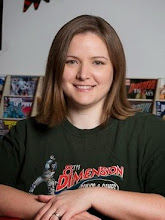Like most people in the Houston/Galveston area, Jeremy and I spent a good chunk of last September without electricity following Hurricane Ike. We usually spend most of our free time at home watching DVDs or something on the TiVo, so when this option was taken away from us we were at a loss. Once the sun went down, we were like birds in a cage with a blanket thrown over it. Since we never were quite ready to go to sleep at 9pm, we decided to read to each other by flashlight since it generally was too hot to do anything but sit still. What did we decide to read? Books about movies and TV, of course.
We took turns reading. My pick was Television Without Pity: 752 Things We Love to hate about TV. It was written by Tara Ariano and Sarah Bunting, founders of Television Without Pity, or TWoP, as people who spend a lot of time goofing off on the clock already know. The book is pretty funny, even though I disagree with a number of their opinions on certain TV shows (The O.C. was awesome, and Richad Belzer rocked on Homicide. There, I said it.) and am mostly mystified by the entries about various reality shows since I've never watched them. Fortunately, the book is funny regardless. If you watched much TV between 1980 and 2005, you probably can get something out of it. Its greatest strength in the post-Ike period was that it's easy to read aloud in small increments using only a flashlight. It's also good for daylight car trips.
Jeremy's selection was Seagalogy: A Study of the Ass-Kicking Films of Steven Seagal by Vern, a writer for Ain't It Cool News. Prior to reading this book, I never had watched an entire Seagal movie, although I had ridiculed brief clips from them if we ran across them on cable. Once we got our electricity back, I watched about half a dozen of them in short order. The book was a real surprise because while it's very funny and spends plenty of time discussing the weirdness and frequent shortcomings of the Seagal canon, it's not bashing the movies. It's definitely lighthearted, but the author takes the subject seriously. Vern is especially interested in how Seagal usually tries to work some left-leaning philosophies into his films, which is the polar opposite of most '80s and '90s action films. You will believe that an ultraviolent action movie can preach Buddhism and nonviolence! Well, almost. But Seagal's movies do tend to have messages involving nonviolence, questioning government authority, environmentalism, animal rights, and so on. The fact that these messages generally are delivered in the clumsiest, most ham-fisted way possible is the source of some of the book's humor, as well as some of the unintentional entertainment factor in the films, but the point is thet Seagal tries. He really does seem to want to make the world a better place, one broken bad-guy wrist at a time. I enjoyed the book a lot even though I hadn't watched any of the the movies; everything made sense, and I think the book will be a pleasant surprise for anyone who enjoys reading analyses of pop culture.
Subscribe to:
Post Comments (Atom)

No comments:
Post a Comment